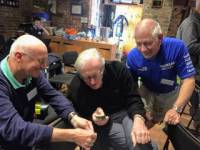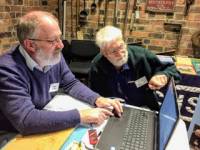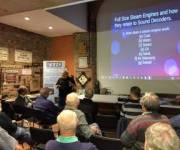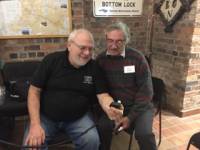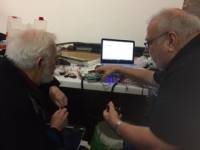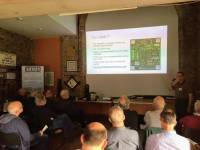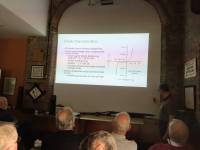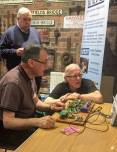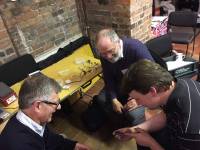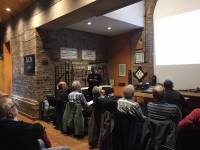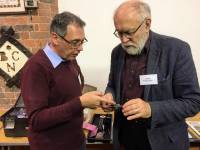MERG West Midlands Area Group (WMAG)
January 2024
We were given two presentations in the morning.
Module Interfacing Inputs & Outputs
David Roberts
What JMRI can do for you - Decode Pro
Simon West
Both talks can be viewed in the area group presentations section of the knowledge here. https://merg.org.uk/merg_wiki/doku.php?id=helpsystem:presentations
September 2023
We were given two presentations in the morning.
How to remove components
David Roberts
Raspberry Pi Pico
Colin Mitchell
Both talks can be viewed in the area group presentations section of the knowledge here. https://merg.org.uk/merg_wiki/doku.php?id=helpsystem:presentations
We donated £60 to the Canal Society for the use of the venue.
JULY 2023
We were given two presentations in the morning
Ask the Chairman
We were delighted to welcome MERG Chair, John Gowers. John talked about his time in office so far. He also outlined the way forward and the committee's plans for the future. A meaningful discussion with area group members took place
CBUS and Missenden St Mary
Pete Brownlow gave an in-depth talk and demonstration of CBUS on his own layout of Missenden St Mary.
Once again, we thank our speakers for such comprehensive presentations and for those who consistently support the area group. The money collected at the meeting has been donated to the Canal Society for the use of the venue.
April 2023
We were given two presentations in the morning
Design Spark
Andy Cumming presented 'Design Spark' the free software available from the RS components that allow users to develop design conception schematics that ultimately leads to the creation of a PCB for use on their model railway.
For those interested in using the software, there is a MERG Design Spark section in the knowledge-base. This includes reference to a library containing many of the components used in kits. More details can be found here https://www.merg.org.uk/merg_wiki/doku.php?id=pcblayoutsoftware:design_spark
Sounds Right
Tony Chamberlain presented 'Sounds Right'. Constructing an Arduino-driven sound module is reasonably undemanding. Finding the sounds you want to use with the player, in a model railway situation, is less so. Tony's talk briefly outlined the processes used to get some realistic sounds at next-to-no cost and modify them to your requirements using Audacity software which can be downloaded here https://www.audacityteam.org/ For those unable to attend our meeting, Tony tells me he intends to give the talk to our neighbours, MERG Warwick & North Oxford area group later in the year.
Both talks can be viewed in the area group presentations section of the knowledg-knowledgeablebase here. https://merg.org.uk/merg_wiki/doku.php?id=helpsystem:presentations
Once again, we thank our speakers for such compressive presentations and for those who consistently support the area group. The money collected at the meeting has been donated to the Canal Society for the use of the venue.
January 2023
We were given two presentations in the morning by our Warwick and North Oxford Lead Simon West and MERG Education and Training Officer John Fletcher.
Universal Firmware
MERG Warwick & North Oxford AG Lead, Simon West, talked on universal firmware that allows functionality of up to 16 input and output channels. He explained how the univeral capability, combined several module firmware, into one. Configuration of the firmware is achieved using FLIM. Simon then proceeded to tell us what hardware could be used. ie CANMIO, CANV series boards (CANFLIM IO) but one should be mindful of the hardware capabilities of the hardware when mixing input and output types. Two types of events were then introduced
Produced or happenings is an event the firmware sends in response to something i.e. input changes/ status changes or achieved.
Learnt or consumed event causes an action to occur in the firmware i.e. change output state or operate a servo.
This was followed by an introduction to his test board (See photo) Simon then explained the practical steps to configure the firmware:
Concluding his talk Simon, in the first instance, demonstrated how to set up a simple servo, and then adding LEDs, relays and servo movement position indicators.
In the afternoon session, he gave a hands-on practical demonstration to those members interested in learning more about the firmware. Here are images of his test board and Simon demonstrating the firmware capabilities.
We thank John and Simon again for their support of our area group.
Ardunio - latest developments
John explained that he wanted to make members aware of the wide range of options available using Arduino and Raspberry Pi Pico boards. He reflected on the talk he gave to the group previously in 2019 and described how much had changed since then. More powerful hardware options Raspberry Pi Pico (not an Arduino; can use Arduino IDE) More options to solve problems More examples of applications Arduino IDE Version 2 More Arduino SIG videos are in the knowledge base. John then outlined what activity had taken place with the MERG Arduino special interest group (SIG) and briefly introduced us to a hat or shield that is currently being prototyped and tested. Images of the CAN HAT can be found in the presentation see the link below
John brought along his test rigs to the meeting, and in the afternoon session, he expanded on the morning talk by explaining to members various elements and configurations. In the images his test rig and the various options
October 2022
We were given two presentations in the morning by Andy Cumming and one by David Roberts in the afternoon in our Show and Tell session.
My Layout
Andy gave us a presentation on the development of his model railway. How it all started in University days and what it is today. Andy described the successes and pitfalls of developing layout in his loft.
My solutions
Andy's second talk focused on the solutions he developed whilst overcoming some of the problems with his layout.
MERG Layout Control
David gave a short presentation on CBUS, EzyBus and PTP-Lite.
Once again we thank Andy & David for the work they have put in for the benefit of the Area Group
July 2022
We were given two presentations at our July meeting.
MERG CANCAB Options
We were delighted to welcome the Warwick and North Oxford Area Group Leader, Simon West, who offered to talk on the MERG CAB options and particularly what will be the new CANCAB2 kit as well as his own slightly larger version. It was a useful opportunity to get further feedback on the new kit version and views on pot operation vs. encoder.
An Introduction to Electrical Measuring and Testing.
Also, in the morning David Roberts presented An Introduction to Electrical Measuring and Testing. This talk provided an introduction to electrical and electronic test equipment as applicable to model railway electronics. The equipment discussed ranged from the simple multi-meter to the more specialist devices such as the logic probe and the oscilloscope. The presentation also covered how a Digital Multi Meter (DMM) is used to make various measurements.
In the afternoon David kindly offered to demonstrate some of the equipment mentioned in his presentation. Simon discussed with members various CANCAB options mentioned in his talk.
And finally, we were delighted to welcome back Peter Wilson and the superb cake! Thank you, Aileen.
April 2022
Train on Tack indicators (TOTIs)
Andy Cumming talked how he experimented with different types of TOTis finally settling on his dedicated design. Using Design Spark, he explained the stages involved i.e. design schematic, PCB outline and Gerber file production readiness for PCB fabrication. Andy detailed some of the highs and lows of the process. The talk concluded with a demonstration of his working TOTi. In the photos, we see the CANPAN Test Panel displaying LEDS i.e., TOTI active and inactive.
Semaphore experience: a layman’s guide over many years.
Tony Chamberlain is well versed in semaphore signalling having been invited into a signal box at an early age (the bug never left him). He has recently stepped down from his position as a signalman, on the Severn Valley Railway. Tony's presentation commenced by explaining how railway signalling evolved. We were shown examples of various types of signals. Composition, variations in design and physical locations alongside line side images and track layouts were displayed showing some of the complexities the signal faces where safety is the number 1 priority. Perhaps one of the most intriguing images was that view from Severn Valley Railways Bridgenorth South signal box which is the only one in the country where you can see live elephants! Elephant by the Track is a new one for me.
Demonstrations
David Roberts gave the group a demonstration of three modules he has recently built:
A DCC Loco identifier. Originally developed by MERG member Duncan Greenwood. The DCC loco identifier provides functionality that displays a locos identity at a button push. While the decoder identifier may be built using an Arduino Uno and a motor shield this unit uses one of Duncan’s PCBs. The output is displayed on a 4-row 20-character Liquid Crystal Display (LCD) via an I2C interface.
DCC++ EX This is a complete wireless DCC command station built using an Arduino Mega 2560 module linked to a motor driver shield and a Wi-Fi module. This enables you to use either Wi-Fi throttle (iPhone) or Engine driver (android) to operate your layout https://dcc-ex.com/get-started/index.html. DCC++EX provides a simple and cost-effective entry to DCC control.
NB1 booster It is based on the MERG Kit. David built his version that also incorporates a RailCom cutout.
Design Spark. Andy Cumming followed on his talk from the morning by demonstrating in more detail how to use the software. 4-servo automated gate crossing. Colin Mitchell demonstrated his model of an automatic gate crossing.
CANPAN LED & Switch patch boards
 Andy Cumming mentioned at our last meeting that he had some CANPAN LED & Switch patch boards on order from the manufacturer. Andy tells me these have now arrived.
Andy Cumming mentioned at our last meeting that he had some CANPAN LED & Switch patch boards on order from the manufacturer. Andy tells me these have now arrived.
January 2020
So what is Arduino
David Roberts presented the Arduino in terms of the hardware most commonly used by the Railway Modeller and the Integrated Development Environment (IDE). A look at Shields and other peripherals is included along with a very brief review of the standard interfaces.
October 2019
John Gowers gave a presentation about the mechanics of a steam engine. How to capture real sounds and apply them to your model railway
He also showed us how to insert sound chips into a loco. This was followed by how you configure the captured sounds to the locos' movements and actions.
Here are some of the photos from the day.
July 2019
Electrostatic Discharge: What it is and Why it is Important
David Roberts gave a talk on what Electrostatic Discharge is, how it is caused and the damage that it can cause to modern electronic devices and systems. Simple and affordable measures to mitigate the problems were also described.
The Theory and Practice of a Simple MERG Kit
Some of us assemble kits without knowing very little about the types of components used and why they are important. David’s presentation considers a simple MERG kit – the CANACT – looking at the components used and explaining why they are chosen and how it all comes together to work.
Here are some images of the day.
April 2019
What is Arduino and what can it do for railway modellers
David Thomas presented ‘A CBUS Sound Player’ in which he explained how the project has been inspired by Davy Dick’s sound player (See March 2017 journal and the subsequent threads on the Forum). The set-up uses three main components: an MP3 player, an Arduino and a MCP2515 CAN Bus. He then went on to explain how he configured the various sounds using FCU and also demonstrated how the whole thing connected as a CBUS module.
Tony Jackson gave the second talk entitled ‘A Magnetic Identity’ in which he introduced the use of magnets to obtain the identity of a loco or vehicle (rather than only detecting its presence) to facilitate effective decisions regarding automating aspects of layout operation. Tony explained that attaching magnets to the base of a loco or vehicle and passing in turn over a linear Hall sensor represented a code that could be configured as a specific identifier. I.e. 6 magnets giving a SSNSNS configuration. Tony then explained how he configured individual locos to establish which is North and then used an Arduino sketch to process the results and display the correct loco or vehicle identifier.
October 2018
Wiring and Power supplies for the Railway Modeller
David Roberts gave two talks in the morning.
The first one, focused on wiring for the railway modeller and included
• Theoretical aspects of electrical wiring • Design and implementation of electrical wiring • Examples of wires, tools and terminations
His second talk was Power Supplies and explored:
• History • Direct Current (DC) Supplies • Linear Mode Supplies • Switch-mode Supplies • Sources of Power Supplies • Commercial Devices • Surplus Computer Supplies
July 2018
Howard Watkins was our keynote speaker.
The theme of our meeting was ‘Back to Basics
AM - Two talks given by Howard included
- Theory and practice of Soldering. - Tools and Supplies - Component recognition - Using LEDs
PM - Practical 'HANDS ON' session included an opportunity to build a track tester.


